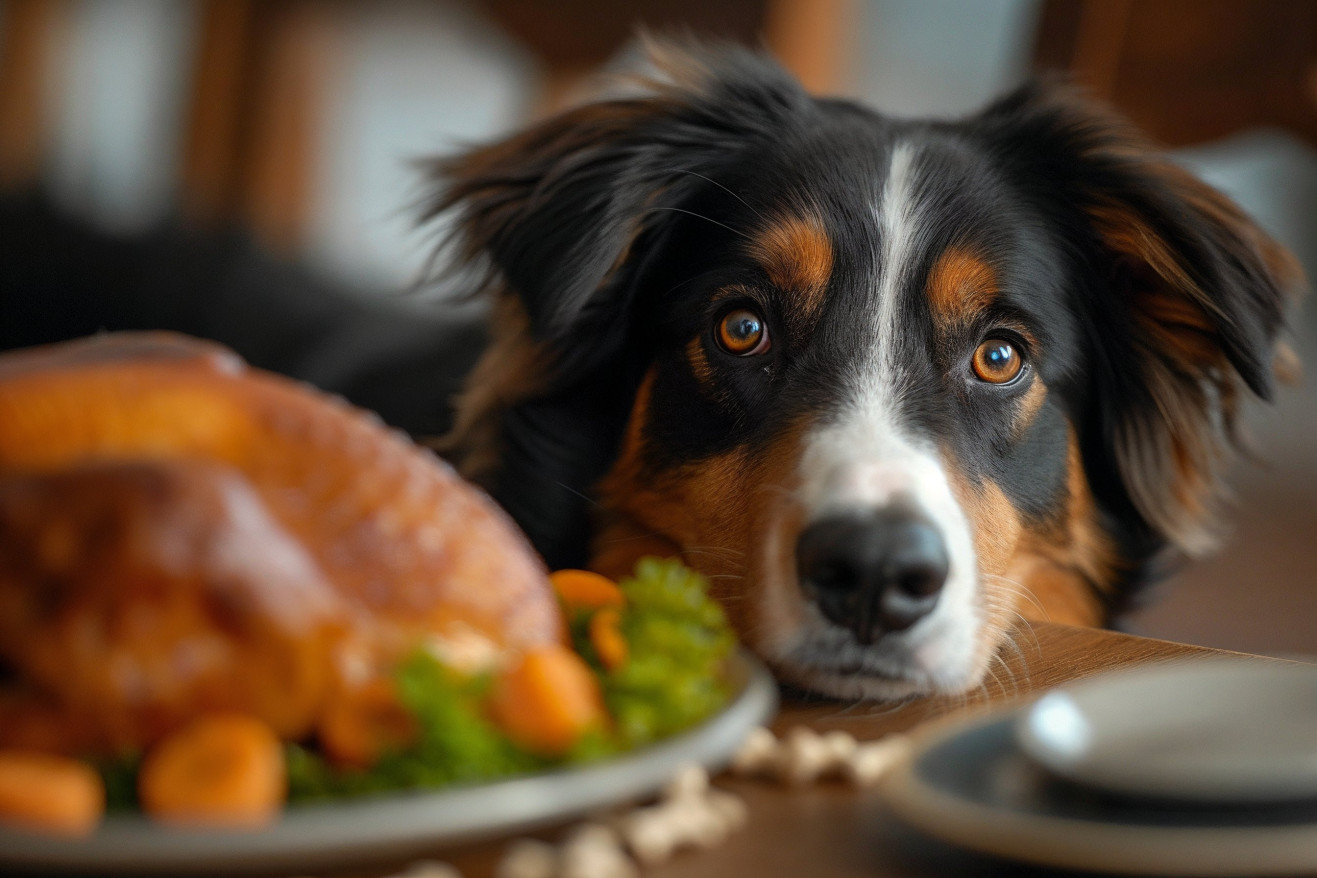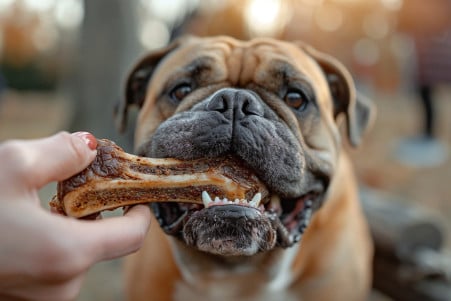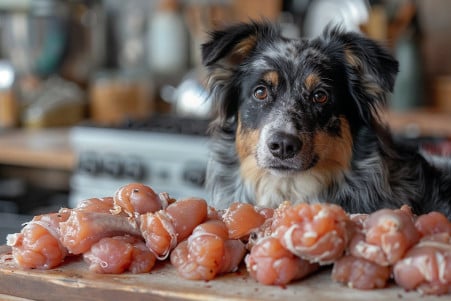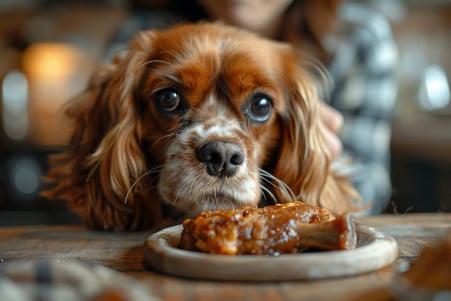Can Dogs Eat Turkey Bones? Safety and Alternatives Explained
11 February 2024 • Updated 9 February 2024

It may look like a delicious snack, but are turkey bones safe for your dog? No, dogs cannot eat turkey bones. Cooked turkey bones can break into sharp pieces, leading to choking or even life-threatening injuries to the digestive system. Raw turkey bones are also dangerous and should be avoided. Instead, always opt for safer, vet-approved chew options for your dog.
This article will review the latest scientific research in veterinary medicine and animal nutrition to help you better understand the risks associated with feeding turkey bones to dogs. It will also explain the physiology of these risks and look into other options that will let your dog satisfy their natural chewing instincts without putting their health in danger.
This way, you can feel confident in your ability to make choices that will keep your dog safe and healthy.
Can dogs eat turkey bones?
Turkey Bones Can Be Dangerous for Dogs
While turkey bones may seem like an innocent leftover from a holiday meal, they can actually be very dangerous for your dog. According to Princeton Veterinary Hospital, cooked turkey bones can splinter, causing sharp pieces that could be a choking hazard, puncture your dog’s insides, or cause a blockage that would require surgery. Ingesting turkey bones can cause dogs extreme pain, constipation, and intestinal perforations, which are life-threatening.
Raw turkey bones are less likely to splinter, but they can still be dangerous due to bacterial contamination, which can cause an upset stomach.
Heart of Chelsea Veterinary Group notes that while dogs may have evolved from wolves who ate bones, today’s dogs are not equipped to eat turkey bones. If a dog eats turkey bones, Kings Crossing Animal Hospital recommends that pet parents take their dog to the vet immediately to address side effects like gastrointestinal upset, which can cause vomiting, diarrhea, and dehydration.
As a result, turkey bones are a major danger to dogs, as they can cause physical harm and potential illness. Pet parents should be aware and opt for safe, veterinarian-approved chews to keep their pets safe from this danger.
Nutritional Implications of Dogs Eating Bones
In terms of nutritional value, it’s important to note that dogs are omnivores and require a balanced diet that includes proteins, fats, carbohydrates, vitamins, minerals, and water, according to VCA Animal Hospitals.
While bones can provide minerals like calcium and phosphorus, which are important for healthy bones and teeth, the risks associated with bone splinters mean that feeding dogs table scraps that include turkey bones isn’t a safe way to meet these nutritional needs.
This is where a balanced diet that meets AAFCO guidelines, as noted by PetMD, comes into play. This is also where safer alternatives to bones can be helpful.
For example, chews and treats that are made specifically for dogs can offer the same nutritional benefits without the risks. These products are formulated for digestibility and to meet a dog’s nutritional needs, which means they don’t carry the risks of splintering or bacterial contamination.
While dogs have historically been fed bones as part of their diet, the reality is that as the domestic dog’s diet has evolved and commercial pet foods have been formulated to meet specific life-stage needs, dogs no longer need to eat bones to meet their nutritional needs.
As a result, it’s important for pet owners to understand the nutritional needs of their dogs and to know that there are safer, nutritionally equivalent alternatives to natural bones that can meet those needs.
With this information, pet owners can make sure their dogs are eating a diet that meets their nutritional needs while also keeping them safe.
Bone Ingestion and Canine Health
The consumption of bones, especially bones that are brittle and can splinter like turkey bones, can have a major impact on a dog’s digestive system. A paper in the Journal of Veterinary Internal Medicine notes that the management and outcomes for dogs with esophageal or gastric bone foreign bodies are different.
In the worst cases, bones can cause damage and inflammation to the esophagus, which can result in long-term strictures or, in the most severe cases, esophageal rupture that requires surgery.
Real-life cases, such as the one reported by the London Vet Specialists in which a dog was brought in with a bone fragment stuck in its throat, show the immediate risks and the emergency measures that need to be taken to avoid a fatal outcome.
While the endoscopic removal of these foreign bodies is successful, it can lead to inflammation and mild erosions, which, while present in this case, didn’t cause any long-term harm to the patient.
Dogs can have a range of physiological reactions to the ingestion of bones, which is why it’s so important for them to be seen by a veterinarian as soon as possible.
A paper in Veterinary Sciences found that treatment options often include endoscopic or surgical retrieval, which is often successful but can be impacted by the size of the dog, the location of the foreign body, and the experience of the operator.
Clinical outcomes after removal are generally good when the situation is treated quickly, which shows how important it is for dogs to be seen by a veterinarian when they’ve ingested a foreign body.
Why Turkey Bones Are Dangerous for Dogs
Turkey bones, like other poultry bones, are especially dangerous for dogs because they are more likely to splinter. Unlike the thicker bones of larger animals, which are solid and less likely to splinter, turkey bones are thinner and more brittle because they are hollow.
This hollowness makes them more likely to splinter and cause the health problems identified by the FDA and VCA Animal Hospitals. This is in contrast to the thicker, denser bones of animals like beef or bison, which are less likely to splinter when chewed by dogs.
The natural chewing behavior of dogs is at odds with the brittle nature of turkey bones. Dogs chew for a variety of reasons, including stress relief and dental health, according to Preventive Vet.
However, the combination of a dog’s strong jaws and the brittleness of turkey bones makes it more likely that the bones will splinter and cause harm. This makes them a unique danger among the many chew options available to pet owners.
While chewing is a natural and healthy behavior for dogs, ingesting splintered turkey bones can lead to problems ranging from mouth injuries to damage to the gastrointestinal tract and other organs.
As a result, because dogs need to chew, pet owners need to be selective about the kinds of chews they offer. Choosing safe, non-splintering options can help prevent the injuries that can result from turkey bones, ensuring that a natural behavior is in line with safe, healthy practices.
The Science of the Chew: Cognitive Benefits of Dog Chewing
In addition to the physical act of chewing, dogs experience a number of cognitive benefits from chewing. A study from Auburn University’s Canine Performance Sciences program has shown that chewing can impact a dog’s working memory, especially when it comes to tasks that involve spatial memory.
Meanwhile, a study published in the Journal of Applied Animal Behavior found that chewing sessions increased the performance of dogs with higher levels of fear, showing that there may be a therapeutic element to this natural dog behavior.
The need to chew is rooted in dogs’ evolutionary history, an instinctual behavior that can be traced back to their ancestors’ need to hunt and scavenge for food. According to Best Bully Sticks, chewing provides dogs with both mental and physical stimulation, helping them feel satisfied and relieved of stress. Chewing also helps dogs burn off energy, which is especially important for puppies and dogs from high-energy breeds.
That said, if a dog is chewing excessively or inappropriately, it can be a sign of boredom or anxiety.
Dog experts, including dog trainers and ethologists, recommend that dog owners make sure their pets have plenty of time to chew so that they can use their energy and fulfill their natural instincts in a positive way.
To ensure that a dog’s chewing habits are safe, pet parents should make sure that their dogs have access to appropriate chew toys and treats, like bully sticks, that will help them satisfy their urge to chew without the dangers associated with turkey bones.
Final Thoughts: Can Dogs Have Turkey Bones?
In summary, while turkey bones may seem like a healthy, natural option for your dog to chew on, the dangers they present far outweigh any potential benefits. Information from veterinary hospitals like Princeton Veterinary Hospital and Kings Crossing Animal Hospital has shown that cooked bones can splinter and cause dogs to choke or suffer from serious gastrointestinal issues. Raw bones, meanwhile, can lead to bacterial infections and other digestive problems.
While bones do contain important minerals like calcium and phosphorus, these nutrients are better provided in a more balanced and controlled way through the dog food that’s available on the market. VCA Animal Hospitals has noted that the risks associated with natural bone fragments make them an impractical choice for today’s dogs.
Furthermore, the physiological impact on a dog’s digestive system and the makeup of turkey bones have shown that they are dangerous for dogs. Veterinary research and case studies have proven that the consequences of dogs eating bones can be severe and that it’s important for pet owners to seek medical attention for their pets as soon as possible.
In addition, we’ve explored the psychological and behavioral reasons that dogs like to chew, which has shown that it’s important for pet owners to offer safe alternatives that meet this instinct without putting their pets at risk.
Ultimately, it’s up to pet owners to make sure that their dogs are safe by choosing safe chew options and steering clear of the dangers of turkey bones. By doing so, they can help ensure that their pets stay healthy and happy without exposing them to potential harm.


